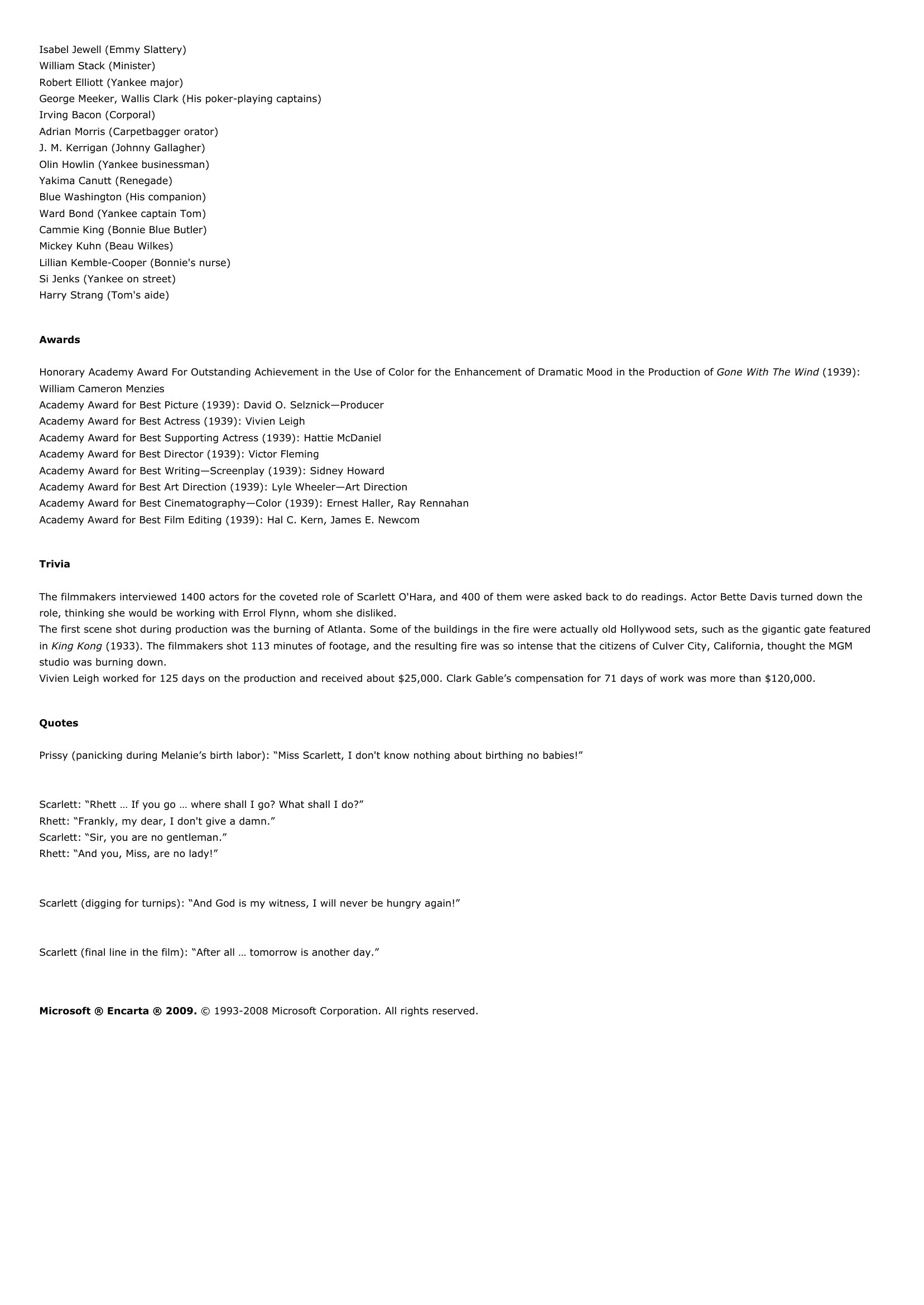Gone with the Wind Gone with the Wind, motion-picture epic about a tempestuous Southern belle and the changes in her life due to the American Civil War (1861-1865), based on the bestselling novel by Margaret Mitchell.
Publié le 12/05/2013

Extrait du document


«
Isabel Jewell (Emmy Slattery)William Stack (Minister)Robert Elliott (Yankee major)George Meeker, Wallis Clark (His poker-playing captains)Irving Bacon (Corporal)Adrian Morris (Carpetbagger orator)J.
M.
Kerrigan (Johnny Gallagher)Olin Howlin (Yankee businessman)Yakima Canutt (Renegade)Blue Washington (His companion)Ward Bond (Yankee captain Tom)Cammie King (Bonnie Blue Butler)Mickey Kuhn (Beau Wilkes)Lillian Kemble-Cooper (Bonnie's nurse)Si Jenks (Yankee on street)Harry Strang (Tom's aide)
Awards
Honorary Academy Award For Outstanding Achievement in the Use of Color for the Enhancement of Dramatic Mood in the Production of Gone With The Wind (1939): William Cameron MenziesAcademy Award for Best Picture (1939): David O.
Selznick—ProducerAcademy Award for Best Actress (1939): Vivien LeighAcademy Award for Best Supporting Actress (1939): Hattie McDanielAcademy Award for Best Director (1939): Victor FlemingAcademy Award for Best Writing—Screenplay (1939): Sidney HowardAcademy Award for Best Art Direction (1939): Lyle Wheeler—Art DirectionAcademy Award for Best Cinematography—Color (1939): Ernest Haller, Ray RennahanAcademy Award for Best Film Editing (1939): Hal C.
Kern, James E.
Newcom
Trivia
The filmmakers interviewed 1400 actors for the coveted role of Scarlett O'Hara, and 400 of them were asked back to do readings.
Actor Bette Davis turned down therole, thinking she would be working with Errol Flynn, whom she disliked.The first scene shot during production was the burning of Atlanta.
Some of the buildings in the fire were actually old Hollywood sets, such as the gigantic gate featuredin King Kong (1933).
The filmmakers shot 113 minutes of footage, and the resulting fire was so intense that the citizens of Culver City, California, thought the MGM studio was burning down.Vivien Leigh worked for 125 days on the production and received about $25,000.
Clark Gable’s compensation for 71 days of work was more than $120,000.
Quotes
Prissy (panicking during Melanie’s birth labor): “Miss Scarlett, I don't know nothing about birthing no babies!”
Scarlett: “Rhett … If you go … where shall I go? What shall I do?”Rhett: “Frankly, my dear, I don't give a damn.”Scarlett: “Sir, you are no gentleman.”Rhett: “And you, Miss, are no lady!”
Scarlett (digging for turnips): “And God is my witness, I will never be hungry again!”
Scarlett (final line in the film): “After all … tomorrow is another day.”
Microsoft ® Encarta ® 2009. © 1993-2008 Microsoft Corporation.
All rights reserved..
»
↓↓↓ APERÇU DU DOCUMENT ↓↓↓
Liens utiles
- The Graduate The Graduate, motion picture about a disillusioned college graduate who returns home to live with his upper-middleclass parents and faces amorous advances from their neighbor's wife, based on the novel by Charles Webb.
- The Godfather The Godfather, box-office hit motion picture about the fortunes of a prominent Mafia family during the 1940s and 1950s, based on a best-selling novel by Mario Puzo.
- Clark Gable Clark Gable (1901-1960), American motion-picture actor, best known for his portrayal of Rhett Butler in the film Gone with the Wind.
- The Sound of Music The Sound of Music, motion picture about a religious young governess who brings music and happiness to a widower's large family, set in Austria during World War II (1939-1945).
- Psycho Psycho, motion picture about a deranged innkeeper and his mother, based on a novel by Robert Bloch.







